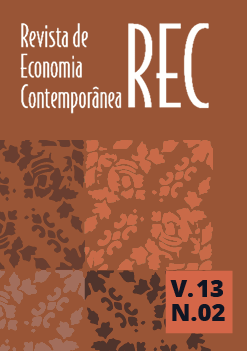ANÁLISE DA COMPETITIVIDADE DAS EXPORTAÇÕES DO COMPLEXO SOJA BRASILEIRO DE 1995 A 2006: UMA ABORDAGEM DE MARKET-SHARE // ANALYSIS OF THE EXPORTS COMPETITIVENESS OF THE COMPLEX SOY BRAZILIAN FROM 1995 TO 2006: AN APPROACH OF MARKET-SHARE
Palavras-chave:
fontes de crescimento, competitividade internacional, agronegócio da soja // growth sources, international competitiveness, soy agribusinessResumo
RESUMO: Este artigo objetivou identifi car o comportamento das exportações do complexo soja brasileiro de 1995 a 2006, utilizando o modelo de comércio internacional Constant-Market-Share para os períodos 1995 a 1998, 1999 a 2001 e 2002 a 2006. Com base nas inferências feitas pode-se observar que os efeitos competitividade e crescimento do comércio mundial foram os que mais colaboraram para o crescimento das commodities grão, farelo e óleo de soja nos períodos analisados. As inferências deste trabalho foram feitas a partir de dados coletados junto ao Sistema de Análise das Informações de Comércio Exterior (Alice), da Secretaria de Comércio Exterior (Secex), à Food and Agriculture Organization of the United Nations (FAO) e à Organização Mundial do Comércio (OMC). Com base nos resultados encontrados pode-se afi rmar que Brasil tem uma importância signifi cativa no comércio mundial de soja e apresenta condições edafoclimáticas favoráveis ao aumento da produção.
ABSTRACT: This study has the aim of identifying the behavior of the Brazilian soy complex exports from 1995 to 2006. For this, it was used the model of international commerce Constant-Market-Share from 1995 to 1998, 1999 to 2001 and 2002 to 2006. Based on the interferences done, it was observed that the effects competitiveness and growth of the world-wide commerce collaborated a lot for the commodities growth grain, bran and oil soy in the analyzed periods. The analyses of this paper were done through collected data from the System of Analysis of Information of the Exterior Commerce (Alice), the General Office of Exterior Commerce (Secex), the Food and Agriculture Organization of the United Nations (FAO) and the World-wide Organization of the Commerce (WTO). Based on the considered result, it is possible to infer that Brazil is significantly important in the worldwide commerce of soy and presents favorable soil and climatic conditions to the increase of the production.
Downloads
Downloads
Publicado
Edição
Seção
Licença
Todo el contenido se publica bajo una licencia Creative Commons CC-BY, salvo que se indique lo contrario.


